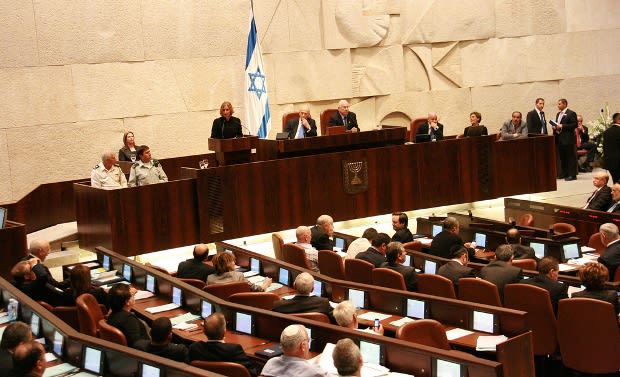
Winston Churchill once famously quipped that democracy was the worst form of government – except for all the others. But then Britain’s wartime PM never met Israel’s dysfunctional form of parliamentary rule, an arrangement that awkwardly perches on the thin edge of democracy.
Unlike in other Western countries (except the Netherlands) where voters pick their representatives in district elections, in Israel – at both the federal and municipal levels – citizens select party slates chosen by party central committees. As a result, there is no one to whom concerned citizens like myself may directly bring their concerns or issues, either nationally or locally, just as there is no one who they personally elected.
While rule by party slate in effect disenfranchised voters for the last 60 years of statehood, the system – periodically tweaked by raising the minimum number of votes to qualify for a seat in the 120-member parliament to the current two percent – muddled along until now. But the February 10 election for the 18th Knesset demonstrated that the party slate method simply no longer suits Israel. Under the present system, the country has lost its capacity to elect a durable and functioning parliamentary government.
There were 33 party lists competing for that election – an all-time record, topping the 31 slates that competed for seats in the 15th and 17th Knessets. This splintering does not reflect a flourishing democracy, but rather a deepening despair with the functioning of the political system.
The result is deadlock, an almost perfect tie between the Kadima party with 28 mandates and the Likud party with one less. Tellingly no one party received even close to 25 percent of the votes, let alone a majority that would ideally allow a government to implement its policies without its hands tied by coalition agreements.
What is to be done?
In the 17th Knesset, Menahem Ben-Sasson – a Jewish history scholar, former president of the Hebrew University of Jerusalem and Kadima MK, called for a series of amendments including to the Basic Laws – which serve as the core of government in the absence of a constitution.
Among his suggestions, endorsed by the long-standing recommendation of expert committees, was for half of the 120-seat Knesset to be directly elected. Unfortunately the many smaller parties in the government torpedoed his efforts at regional representation – precisely because they understood it would undermine the means by which they continue to feed at the public trough.
While drawing the boundaries of 60 voting districts promises to be problematic, with issues of gerrymandering to include or exclude certain populations, there is no alternative but to bite the proverbial bullet.
Another fundamental problem with the current form of government is the weakness of the executive branch and its lack of separation from the government itself. The Prime Minister’s Office must be given broader powers in order for the current system of checks and balances to function properly.
It is hoped that the major parties in the 18th Knesset will be able to cooperate to enact a law raising the number of MKs needed for a no-confidence vote from 61 to 70 or even 80. Such a law would end the permanent threat tiny factions have of toppling the government, and thus reduce the horse-trading which passes for coalition building.
Similarly the electoral threshold should be raised from the current two to four percent, in line with most parliamentary democracies.
Finally the system of party primaries must be modified and democratized along the lines of the Dutch system whereby voters may erase the names of candidates, thus giving them a direct say in the composition of a party list.
What if these steps are not implemented?
Amnon Rubinstein, a former Meretz party MK and Minister of Education who currently teaches law at the Interdisciplinary Center in Herzliya, cautions the heads of Israel’s major parties – Kadima, Likud, Israel Beiteinu and Labor – that Israel’s current system of dead-end governments is reminiscent of the paralysis of France’s Third Republic on the eve of World War II.
“The leaders of these parties must realize that it is the function of any democracy to arrive at a compromise between representation and effectiveness, and that Israel’s unique, purely proportional system achieves neither.”
That’s something Winston Churchill understood only too well – and which Neville Chamberlain never grasped.
Gil Zohar is a journalist in Jerusalem, Israel. He made aliya from Toronto, Canada in 2005. There he was involved with politics at the municipal, provincial and federal levels, and unsuccessfully ran for York City Council in 1992.
The words of this author reflect his/her own opinions and do not necessarily represent the official position of the Orthodox Union.



